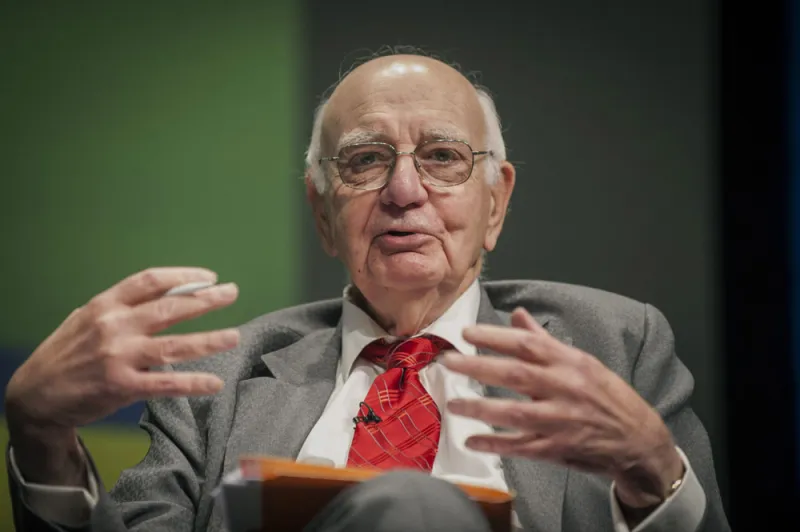Paul Volcker, an economist who guided decades of American economic policy — including waging war on inflation as chairman of the U.S. Federal Reserve — has died at age 92.
He passed away on Sunday, December 8, according to a statement from his public policy group, the Volcker Alliance.
Volcker worked for the U.S. government for almost 30 years, culminating in two terms as chairman of the board of governors of the Federal Reserve System, a position he held from 1979 to 1987. He would later go on to serve as chair of President Barack Obama’s Economic Recovery Advisory Board from 2009 to 2011, when he helped introduce the bank-curbing Volcker Rule as part of the Dodd-Frank Wall Street Reform and Consumer Protection Act.
Volcker began his career in monetary policy in 1952 as an economist at the Federal Reserve Bank of New York. He later worked in the U.S. Treasury Department under presidents John F. Kennedy, Lyndon Johnson, and Richard Nixon. Volcker then returned to the Federal Reserve Bank of New York as its president in 1975.
In 1979, President Jimmy Carter nominated Volcker for the role of Fed chairman amid rising consumer prices. That year, inflation was on track to reach an annual rate above 11 percent — a rate that would increase further, to a peak of 13.5 percent in 1980.
“Things started to feel like they were out of control,” said Bill Michaelcheck, founder of Mariner Investment Group, speaking to Institutional Investor in 2017. The bond investor recalled how Volcker curbed inflation by dramatically increasing interest rates over the span of a single weekend.
“In October of 1979 they did it,” he said. “They raised interest rates hundreds of basis points… doubled interest rates literally from Friday to Monday.”
[II Deep Dive: The Weekend Paul Volcker Raised Interest Rates]
The controversial move helped push the U.S. economy into a yearlong recession from 1981 to 1982, as the federal funds rate — the Fed’s interest rate — rose to 20 percent. However, it was successful in reining in inflation: The annual inflation rate fell to 3.2 percent in 1983 and has stayed down ever since.
Thirty years after beginning his tenure as Fed chairman, Volcker was tapped to lead the Obama administration’s response to the 2008 financial crisis. As chairman of the Economic Recovery Advisory Board, Volcker pushed for restrictions on big banks as part of a larger regulatory reform package.
As Institutional Investor reported at the time, “section 619 of the 2,300-page Dodd-Frank Act, better known as the Volcker rule, prohibits deposit-taking banks from engaging in short-term proprietary trading. It also sets strict limits on how much banks can invest in hedge funds and private equity: just 3 percent of a fund’s assets.”
The Volcker rule — like the 1979 interest rate hike — proved controversial. Federal Reserve economists published a paper in 2017 finding that the rule has had a severe impact on bond market liquidity, and Congress last year passed a deregulation bill to roll back parts of the Dodd-Frank Act, including weakening the Volcker rule.
Volcker remained engaged in public policy after his role in the Obama administration, founding the Volcker Alliance in 2013 to promote “effective management of government.” Last year, he published a memoir with Christine Harper entitled Keeping At It: The Quest for Sound Money and Good Government.
In a statement on Monday, current Federal Reserve chair Jerome Powell praised Volcker for exemplifying the “highest ideals — integrity, courage, and a commitment to do what was best for all Americans.”
“He believed there was no higher calling than public service,” Powell said. “His contributions to the nation left a lasting legacy.”







